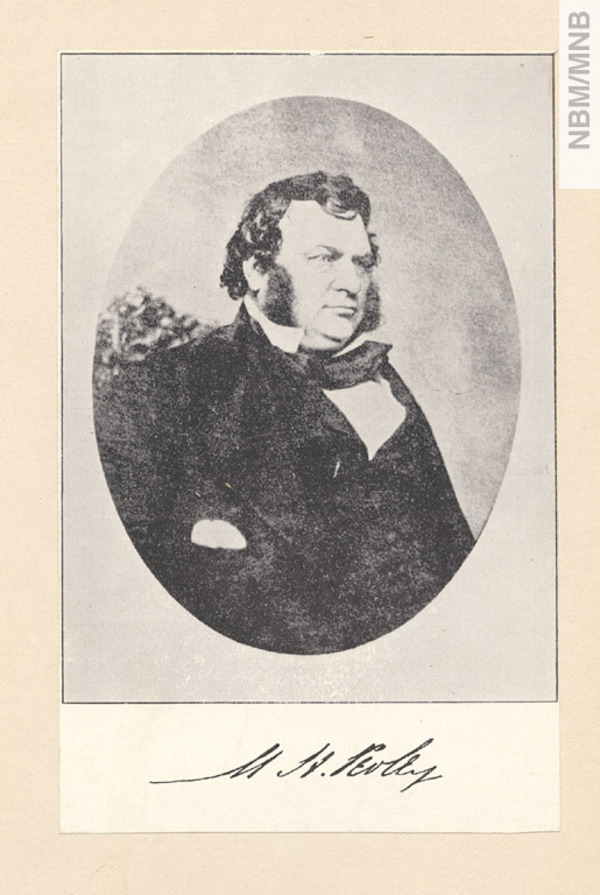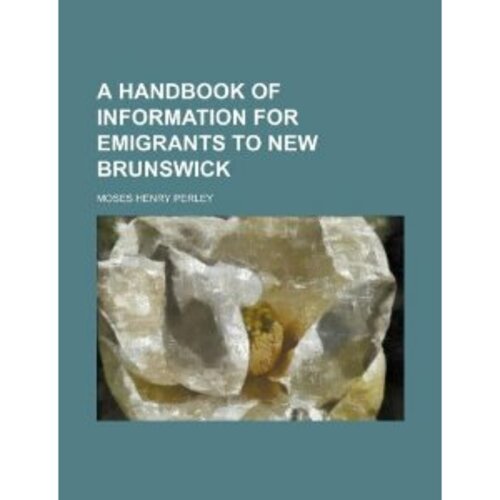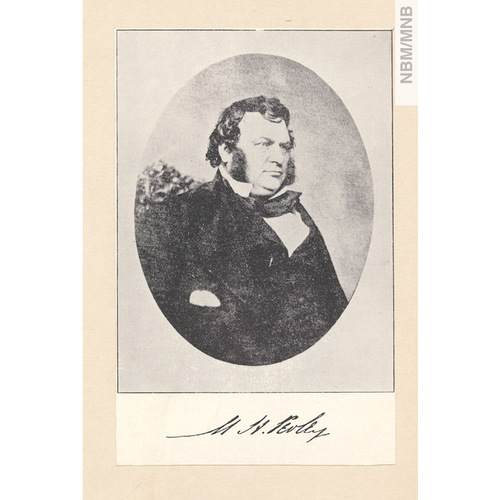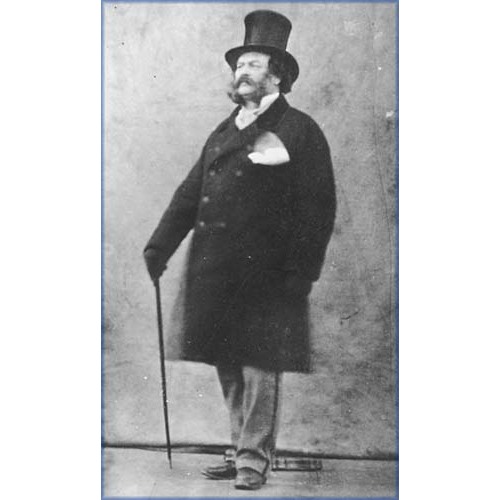
Source: Link
PERLEY, MOSES HENRY, lawyer, entrepreneur, naturalist, author, and office-holder; b. 31 Dec. 1804 at Maugerville, Sunbury County, N.B., of pre-loyalist New Brunswick ancestry, son of Moses Perley and his cousin Mary Perley; m. 6 Sept. 1829 Jane Ketchum, and they had eight children; d. 17 Aug. 1862 on board the HMS Desperate off the Labrador coast.
Shortly before Moses Henry Perley’s birth his father was accidentally killed. His mother moved to Saint John, N.B., when he was very young and he was educated there in the public schools. As a boy he spent his summers hunting, fishing, and trading with the Indians on the Saint John River and its tributaries. Perley’s interest in the welfare of the Indians increased after an unfortunate incident in 1822 when he accidentally killed an Indian while target shooting. During these early years Perley became an avid sportsman and developed his intense lifelong interest in natural history.
Perley studied law and was called to the bar in 1830. As a young lawyer, he still found time to continue exploring the inland waterways of the province, to make frequent visits to Indian settlements, and to begin collecting information on the natural resources of the province which would later assist him in his business life and in his position as emigrant agent.
Between 1835 and 1838 Perley was involved in several business ventures, many of which were unsuccessful. He was secretary of the Lancaster Mill Company, bought mills on the Musquash River, and attempted to develop coal mines on the Salmon River in Queens County. Sometimes he was in partnership with New England interests and in the late 1830s was accused by Tory newspapers of being the leading promoter of American commercial interests in New Brunswick. An attempt to purchase 80,000 acres of land in Charlotte County failed when the Executive Council in 1836 refused to allow Perley to pay in instalments or to refund him money paid in advance for parts of the land which were found unsuitable when surveyed. Throughout his career Perley criticized the Crown Lands Office for restricting instead of encouraging development of the province’s timber resources and the settlement of immigrants. Such opinions may have hurt his chances in 1836–37 when he tried to obtain assistance from the government, which harboured some opposition to land sales to Americans and to Perley’s well-known connections with New England. Moreover his schemes were hampered by a scarcity of American capital for investment abroad created by economic problems in the United States in the late 1830s. Perley continued, nevertheless, to be involved with American businessmen in his own interest and to encourage foreign investment as a necessary means of developing the resources of the province. His American connections later proved useful when he figured in the reciprocity negotiations of 1854.
Perley’s extensive knowledge of Indian settlements and his concern for the Indians’ welfare resulted in his appointment as the province’s commissioner of Indian affairs, an office without salary. Perley claimed to have received this appointment in 1839, but there are no records of his activity before 1841. With Lieutenant Governor Sir William Colebrooke’s permission, he visited all the Indian settlements in the province, and in 1842 began preparing his first report, in which he protested against the encroachments of squatters on Indian lands. He recommended the crown continue to hold in trust the reserves granted to the Indians and that they be encouraged to form village settlements where schools could be established and regular visits could be made by doctors. He felt that this programme should be carried out without interfering with the Indians’ way of life. Encouraged by the lieutenant governor to continue his investigative work, Perley again visited Indian settlements in 1842 and also the Micmac settlements on Prince Edward Island in 1842 and 1843. In the latter years he was offered the post of chief superintendent of Indian affairs for the province of Canada, but a new governor, Sir Charles Metcalfe*, was appointed before negotiations were completed. Perley’s second detailed report on the reserves, submitted to the government in 1843, repeated his recommendations made the year before.
The Indians appreciated Perley’s work and he was made a chief of the Malecites in 1839 and of the Micmacs in 1840. In 1842 he was elected “Wunjeet Sagamore” or “chief over all.” He was often in their settlements – in February 1843 he complained that at times he had “not slept in a bed for two months together” – and he frequently addressed tribal gatherings dressed in Indian clothing.
Perley played a major role in the drafting of New Brunswick’s Indian Act of 1844, which was designed in part to put into effect some of the recommendations of his reports, but at the same time would allow the government to sell some of the reserve lands and to put the money into a fund to be used for the benefit of the Indians. In his capacity as an honorary Indian chief, Perley sharply criticized the act as it was passed. He believed squatters would not be removed from the Indians’ territory, and that the government sale of large sections of the reserves would provide little benefit for the Indians. When he attempted to send objections to the colonial secretary, Governor Colebrooke and his Executive Council refused to forward the letter. A committee of the council was appointed to study his criticisms; it reported that he had “an erroneous idea that its [the act’s] provisions require the Government to make sale of the Indian Reserves and that thus the different Tribes would be deprived of their Hunting grounds and other settlements but partially formed by them.” The committee claimed no government would use its powers in such a way, but the act did, in fact, enable the government to sell any part of the reserves which could be considered a hindrance to settlement if left with the Indians.
Under the provisions of the act Perley was appointed commissioner for Indian affairs for Saint John County. However, as the man most knowledgeable about Indian affairs throughout the province, he was sent in 1845 to Northumberland County to make inquiries into the claims of squatters on Indian lands, and in September of that year he was also appointed commissioner to act with local commissioners to put various provisions of the act into effect. He was also to visit all the reserves in the province, look into settlement of the Indians on them, and investigate squatters’ claims. He soon found that adverse public opinion and government reluctance, particularly to remove squatters, hampered enforcement of the act. Squatters on the Tobique Reserve informed him they would burn their buildings rather than pay for clear titles to the lands. In 1848 Perley pointed out that land was being sold on credit and not a penny had gone into the Indian fund. There was, therefore, no money to pay the local commissioners or to be used for the Indians. Perley recommended that sufficient land be reserved for the use of the Indians and that the government provide a fixed annuity for them. The provincial government was not favourable, and in July 1848, when Perley intervened in a dispute in Northumberland County, he was warned against such action where he lacked government authority. He took his protest to the lieutenant governor, Sir Edmund Walker Head. There is no record of a meeting, but soon after this time Head informed the colonial secretary that Perley would no longer be employed in Indian affairs, having exceeded his office by publicly criticizing the government’s Indian policy.
Perley had often encountered difficulty obtaining reimbursement for his expenses in visiting the settlements but was told he would be repaid from the Indian fund “when funds are available.” Although he was not paid a regular salary, he often received legal work from the government. He also continued to practise law and to carry on various business activities. After helping to establish the mechanics’ institute in Saint John in 1838, he frequently lectured there on the history and resources of the province. He was also active in the formation of the Provincial Association in Saint John in 1844, the principal aim of which was the protection of manufacturing and agricultural interests by tariffs.
During the 1840s Perley undoubtedly became the best informed man in the province on rivers, natural resources, and fisheries. He believed the government had not done enough to develop these resources. In 1843 he began on his own a study of the fisheries of the Gulf of St Lawrence. The same year he also undertook the settlement of immigrants on lands near Saint John, collecting petitions from settlers wishing to purchase lots in Mechanic Settlement and Cork and signatures from those willing to sign bonds guaranteeing their purchases. He helped in laying out the two settlements and collected data on their progress for the government in 1843 and 1844.
Recognized as an able and energetic man, interested in the development of the province, Perley was appointed by the provincial government acting emigrant agent in June 1843 when illness struck Alexander Wedderburn*; a few months later his position was made permanent. He was now responsible for supervising the arrival of immigrants and the enforcement of quarantine regulations; he also hoped to use his position as “an excellent field for promoting the settlement of the country and forwarding its best interests.” Perley was resolute in his prosecution of captains and firms for violation of British government regulations in the transporting of immigrants to New Brunswick. He had to deal with shiploads of poor immigrants many of whom were suffering from smallpox, cholera, and other diseases, and frequently recommended assistance for them on their arrival. Perley and his staff could make cash advances to those in distress but they were not always reimbursed by the assembly; in 1846 he threatened to resign over these accounts. The matter was settled in 1847 when the British government stepped in to make Perley its emigrant agent in New Brunswick. By this double appointment his annual salary had increased from £100 to £300.
In 1847 one of his tasks was to find homes for 120 orphans, two of whom he took himself. With the support of many medical men in Saint John, he argued, unsuccessfully, against the New Brunswick government’s choice of Partridge Island as a quarantine station. In 1851 he recommended that it encourage the emigration of young people from Britain, particularly girls between 14 and 16, who would easily find employment as domestic servants, and who would be helped to find proper homes by means of committees set up in the port towns. Perley prepared a handbook for emigrants, which the government agreed to publish in January 1855. He recommended in March 1855 that 1,000,000 acres of land be set aside for deserving British veterans, but nothing came of the proposal.
The New Brunswick government, in recognition of Perley’s abilities, had frequently called on him for special work. In October 1846, when a route was being surveyed for a railway between Nova Scotia and Quebec, he was asked to report on the nature of the country, the mineral resources, the fertility of the soil, and the possibilities for settlement where stations might be located. He was also to study possible branch lines to various New Brunswick cities and towns, and the encouragement such railways would give to the Gulf of St Lawrence and Labrador fisheries. His report, submitted in December 1846, and reflecting the railway enthusiasm of the period, was well received by the government and the colonial secretary. At this time Perley was also preparing his report on the trees of New Brunswick, published in 1847, which was designed to promote the development of forest resources.
Perley was actively interested in other railways, and was involved in the St Andrews and Quebec Railway Company for which in 1847 he spent three months in England. In 1848 he was asked to examine the route being surveyed by John Wilkinson* for the Saint John–Shediac Railway but the work was cancelled because the legislative grant would barely pay the expenses of the surveyor. He attended railway conventions, including the important one in Portland, Maine, in 1850 [see John Alfred Poor*]. In 1848 he persuaded the government to invite Professor J. F. W. Johnston* to New Brunswick to study its agricultural resources. He also spent some time in Fredericton in 1848 and 1849 helping to draft amendments to the Emigrant and Indian acts.
The fisheries provided Perley with another large interest. In 1849 he submitted a report on the New Brunswick fisheries of the Gulf of St Lawrence, which was supplemented later by further studies. In 1848 or 1849 he wrote a preliminary report on the fisheries of the Bay of Fundy and prepared a catalogue of its fishes (published in 1851 and 1852 respectively). In July 1850, after favourable response in New Brunswick and Britain to his reports, he was instructed to make further inquiries into the fisheries in the Bay of Fundy, whenever his duties as emigrant agent would allow. In his tireless study of the inland and sea fisheries in 1849–50 Perley covered some 900 miles, over 500 by canoe. In 1851 he drew up special instructions for the fishery wardens of Charlotte County and recommended the formation of fishery societies along the same lines as the agricultural societies, as well as the establishment of fishing colonies, on the coast. Two years later he made further inquiries on the coast between Miramichi Bay and Baie Verte. In 1849 and 1852 he helped draft legislation to regulate sea and river fisheries. Between 1852 and 1854 he was deeply involved in compiling statistics on the fisheries for the negotiations between the United States and the British North American colonies which culminated in the Reciprocity Treaty. He spent considerable time in the United States at the request of the British ambassador, visiting Washington, New York, and Quebec during the negotiating process.
On his return from New York in November 1854 Perley was concerned about his own future. Except for his salary as emigrant agent he had received only his expenses for all his duties and he was “tired of working for the public without fee or reward.” In 1855 he got this reward when he was appointed a fishery commissioner to enforce the Reciprocity Treaty, with an annual salary of £300, while continuing as emigrant agent. He was given permission in 1857 to visit London on business connected with his duties as commissioner, and in his capacity as emigrant agent was instructed to promote New Brunswick as a desirable place for British emigrants by publishing material he had collected concerning the resources of the province, and by arranging to sell it in London and other cities and ports. Perley suggested ways to promote emigration, most of which were, however, discarded by the New Brunswick government; for instance, one scheme involving assistance to immigrants was rejected as possibly only encouraging many to use New Brunswick as a stepping stone to Canada and the United States, while another to guarantee work for immigrants on such projects as railway construction was turned down because it was not in the government’s power “to guarantee to Immigrants here employment either continuous or temporary or any specified rate of wages.”
After Perley’s appointment as fishery commissioner, several persons sought his position as emigrant agent. In 1858 many of his political allies, such as Edward Barron Chandler*, were no longer in power. The eagerness of Charles Fisher*’s new administration for reform included jobs for friends, and in May 1858 it was decided that Perley’s duties as a fishery commissioner interfered with his duties as emigrant agent. Despite the hesitation of Lieutenant Governor John Henry Thomas Manners-Sutton* because Perley was serving the British as well as the provincial government, he was replaced as provincial agent by Robert Shives. Perley wanted to continue as agent for the British government but it decided that emigration having fallen off so much in recent years, his services, however competent, were no longer needed. He asked to be allowed to continue even without salary, but the governor rejected his offer because it might interfere with Shives’ work.
In 1861 Perley was one of the owners of a new newspaper in Saint John, the Colonial Empire, which aimed to promote the union of the colonies, intercolonial free trade, railway extension, and the development of mineral resources and fisheries. It was critical of the Fisher administration and in that year Perley and his associates were responsible for bringing to light a scandal involving the Crown Lands Office which resulted in Fisher’s resignation.
Continuing as fishery commissioner, Perley visited Prince Edward Island, Newfoundland, and other areas. In the summer of 1862 he became ill on board the Desperate while inspecting the fisheries off the Labrador coast. The captain wanted to bring him to Shediac for medical attention, but he insisted that “politically he would be ruined if he did not this season complete his surveys and visits to the different Bays and fishing stations.” He died on board ship on 17 August and was buried at Forteau, Labrador.
Perley was a versatile, energetic man, and a prodigious writer of letters to government and friends on provincial affairs. Throughout his life he showed concern for the welfare of the Indians and the development of the resources of the province. Until the coming to power of the Reformers, he seems to have used his considerable influence with the government primarily to further what he considered the province’s best interests. Successive lieutenant governors acknowledged his abilities and energy and availed themselves of his services. He was the most zealous emigrant agent the province ever had. Active as a lecturer and writer, he read widely on all subjects, and published a variety of books, including government reports, natural history, and fiction based on Indian legends. Though a self-trained naturalist, he was recognized as the leading ichthyologist in the Maritime provinces, and as one of the most authoritative in North America. There are few errors of importance in his work on the fish of New Brunswick. He laid the foundation of natural science in the province and was the founder of the Natural History Society of New Brunswick.
M. H. Perley was a prolific writer on many subjects. His several reports on Indians include Report on Indian settlements, &c. (Fredericton, 1842). His publications on the fisheries include Report on the fisheries of the Gulf of Saint Lawrence (Fredericton, 1849); Report on the sea and river fisheries of New Brunswick, within the Gulf of Saint Lawrence and Bay of Chaleur (Fredericton, 1850); Report upon the fisheries of the Bay of Fundy (Fredericton, 1851); and a one-volume collection of these reports entitled Reports on the sea and river fisheries of New Brunswick (Fredericton, 1852). He also wrote: Descriptive catalogue (in part) of the fishes of New Brunswick and Nova Scotia (Fredericton, 1852); Handbook of information for emigrants to New-Brunswick (Saint John, N.B., 1854; London, 1857); “Report on the forest trees of New Brunswick,” Simmonds Colonial Magazine and Foreign Miscellany (London), XI (May–August 1847), 129–55, 314–24, 412–29; and “The progress of New Brunswick, with a brief view of its resources, natural and industrial,” H. Y. Hind et al., Eighty years’ progress of British North America . . . (Toronto, 1863), 542–653. He also contributed several articles to the Sporting Rev. (London).
N.B. Museum, Edward Barron Chandler papers, Colebrooke to Chandler (undated); Marriage register B (1828–39), p.31; N.B. Hist. Soc. papers, William Crane correspondence, M. H. Perley to William Crane, 19 March 1837; Indian affairs, M. H. Perley to J. S. Saunders, 17 Aug., 27 Oct. 1846; M. H. Perley papers, personal correspondence, 1813–54 (typescript); Scrapbook 41, p.51; Tilley family papers, temperance; Webster coll. PANB, REX/le/l–g, Colebrooke, letterbooks, 1841–47, pp.29–31, 35–36, 51, 81, 84, 119–20, 200–2, 232–33, 245–47, 257, 269–70, 272–76, 283, 292–93, 300–1, 331; 1841–48, pp.19, 86, 92, 118–19, 131; Head, letterbook, 1850–54, pp.83–84, 373; Manners-Sutton, letterbooks, 1854–58, pp.57, 65, 68, 134, 137, 165, 171, 181, 200–1; 1858–61, pp.23, 46, 61; REX/mi/ex, duplicate minutes, 4, pp.39–42, 94, 158; 5, pp.89–90, 104, 111, 160, 192, 228–29, 266, 363, 389, 401, 414, 439, 449; 6, pp.51, 133, 230, 258, 361, 372, 447–48, 481, 549; 7, pp.194–96, 319–20, 452; REX/pa/Register of appointments and commissions, 1785–1840, pp.95, 141; 1840–57, pp.4, 34, 38–39, 44, 134–36; REX/pa/Surveyor general’s correspondence, 1842, II(a); 1843, I(a), 2–3; 1844, II(d); REX/px, 22, pp.2842–45; 31, pp.398–99, 401, 515–19; 32, pp.13–14, 988–89; 33, pp.151–53, 156–61, 189–91, 202–5; 100, pp.2079, 2125–30, 2132–34; Indians, pp.269–73, 308–15; RLE/S55/zz, letter of M. H. Perley, 28 March 1842; RPS, letterbook, 1842–45, pp.216–17, 476–78, 494, 499; 1845–47, pp.66–67, 245, 255–56, 319, 498; 1847–50, pp.25, 71, 146, 161, 184–85, 208, 241, 295, 305, 310–11, 346, 359, 385–89, 430, 443, 458, 469, 567, 668; 1850–54, pp.60, 403, 465, 524, 544, 552; 1854–57, pp.116, 229, 448, 454, 460, 490–92, 510–11, 590; 1857–60, pp.32, 178. PRO, CO 188/106, 180–201, Head to Grey, 7 Aug. 1848; 205–23, “Memorandum on history of Indians”; 188/127, pp.544–45, 547–48, 585–86; 188/131, 8 Nov. 1854, pp.114–15, 464–70; 188/133, 9 Sept. 1862; 188/137, A. J. Thrupp to Sir A. Milne, 22 Aug. 1862.
Colonial Empire (Saint John, N.B.), 1861. Elgin-Grey papers (Doughty), I, 26–27; III, 1132–33; IV, 1328. Fenety, Political notes and observations, 45, 70, 93, 312, 337, 478, 483, 494–95. N.B., House of Assembly, Journals, 1847, app., “Railway and electro-magnetic telegraph,” cxxxi–clxxxiv; 1848, app., “Quarantine buildings,” xciii–xcv; 1849, app., “Emigrants,” xcvi–cv; 1853, app., “Emigration,” clxxiii–clxxxi; 1854, 340, 359–61; app., “Emigration,” cclix–cclxiii; 1857–58, 88–95, 154. DNB. Harper, Hist. directory. History and genealogy of the Perley family, comp. M. V. B. Perley (Salem, Mass., 1906), 410–15. Morgan, Bibliotheca Canadensis, 305–6. MacNutt, New Brunswick. Philip Cox, “Life of Moses Henry Perley, writer and scientist,” Miramichi Natural History Assoc., Proc. (Chatham, N.B.), IV (1905), 33–40. L. F. S. Upton, “Indian affairs in colonial New Brunswick,” Acadiensis, III (1973–74), no.2, 3–26.
Cite This Article
W. A. Spray, “PERLEY, MOSES HENRY,” in Dictionary of Canadian Biography, vol. 9, University of Toronto/Université Laval, 2003–, accessed February 19, 2026, https://www.biographi.ca/en/bio/perley_moses_henry_9E.html.
The citation above shows the format for footnotes and endnotes according to the Chicago manual of style (16th edition). Information to be used in other citation formats:
| Permalink: | https://www.biographi.ca/en/bio/perley_moses_henry_9E.html |
| Author of Article: | W. A. Spray |
| Title of Article: | PERLEY, MOSES HENRY |
| Publication Name: | Dictionary of Canadian Biography, vol. 9 |
| Publisher: | University of Toronto/Université Laval |
| Year of publication: | 1976 |
| Year of revision: | 1976 |
| Access Date: | February 19, 2026 |





